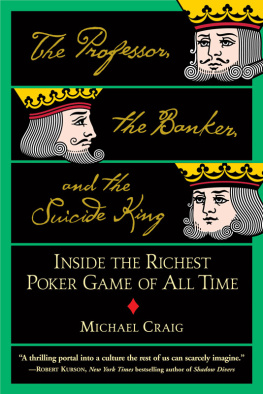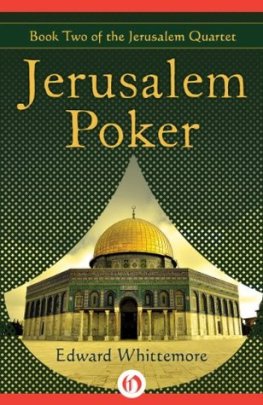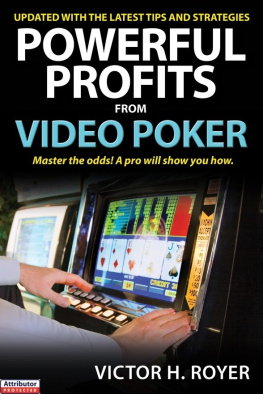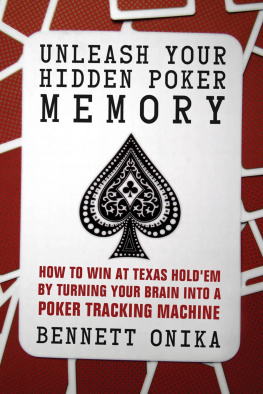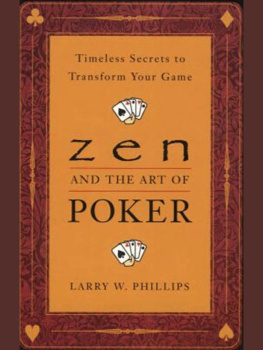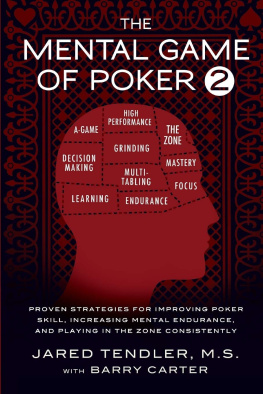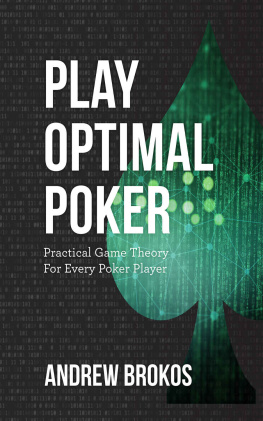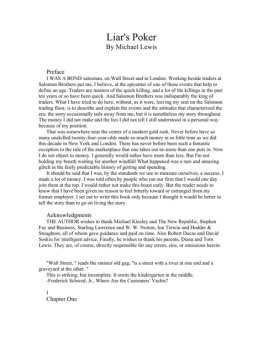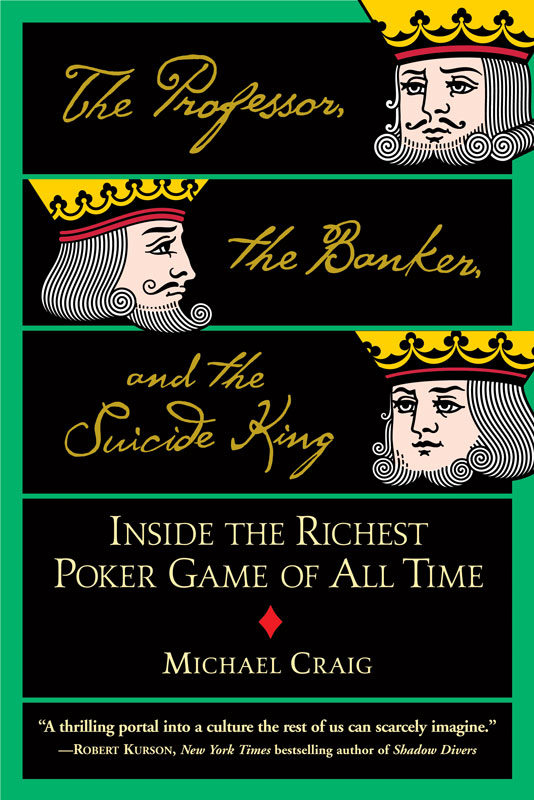Copyright 2005 by Michael Craig
All rights reserved.
Warner Books
Hachette Book Group
237 Park Avenue, New York, NY 10017
Visit our Web site at www.HachetteBookGroup.com.
First eBook Edition: June 2008
ISBN: 978-0-446-53963-0
For Jo Anne, Barry, Ellie, and Val
Four Aces
POCKET KINGS
S how us your pocket kings.
If the cowboy at the other end of the table had pulled out a knife I would have been less unnerved. But he had shown me something more lethal than a blade: a professional poker players powers of observation.
I had started playing Texas Hold Em, the most popular form of poker, in 1992. For a year, I cleaned up in low-stakes Las Vegas games and fantasized about my future as a free-wheeling, high-living professional poker player.
Texas Hold Em seems so simple that such delusions are common. The goal is to make the best five-card poker hand out of a combination of a players two concealed cards, also called hole cards, and five communal cards, called the board. The first round of betting follows receipt of the hole cards. Because betting position is so important and remains the same through the hand, a large disk, called the dealer button (or just the button), passes clockwise around the table, one player per hand, denoting who acts last. To stimulate initial action, instead of antes, hold em imposes mandatory bets, known as the blinds, on the two players to the left of the button. The first player to the left of the button posts the small blind, half an opening bet. The next player posts the big blind, the size of the opening bet.
After the first round of betting, the dealer turns over the first three communal cards, called the flop. After a second round of betting, the dealer turns over the fourth card, known as fourth street or the turn. A third betting round ensues, after which the dealer turns over the last card, fifth street or the river. The remaining players bet once more, and turn over their cards.
Generally, the casino dealing (also called spreading) the game specifies the betting limits. A $3-$6 game, for example, would have opening bets and raises in increments of $3 in the first two betting rounds and $6 in the last two rounds. Texas Hold Em can also be played without betting limits, meaning that although the big and small blinds are set, the players may thereafter bet any amount, including everything they have on the table. No-Limit Texas Hold Em is only occasionally played in cash games, but is extremely popular in tournaments. (Virtually all poker games are played for table stakes, meaning the players cannot bet more than they have on the table. They cant reach into their pockets or borrow more in the middle of a hand. But if someone bets more than an opponent has at the table, the opponent cant be forced to fold. They can go all-in, covering as much of a bet as they have in front of them. Except for unfriendly private games and bad poker movies, no one has to cover a bet for more than they have on the table by putting up their car, house, wedding ring, or fiance.)
I considered myself so proficient at the game by the summer of 1993 that all I needed, to my reasoning, was to step up in class, repeat my stellar low-stakes results, and begin my new life as a globe-trotting professional gambler.
Or should I say our new life? I had a wife, two children, a law partner, and a busy practice. No one was going to encourage (or allow) me to bet the vast sums contested in the top games. I would have to prove my mettle in a poker tournament, demonstrating to all the family, friends, and colleagues who thought I had a screw loose that I was, indeed, pro poker material.
This brought me, in July 1993, to the Aladdin Oasis Poker Tournament and to the dead-eyed cowboy. The Aladdin of 1993 was not the posh mega-resort of today but a relic of the Rat Pack days brought forward three decades without, it seemed, a fresh coat of paint or a carpet shampoo. The decision to schedule three weeks of poker tournaments in Las Vegas in July was exactly the kind of thinking that consigned the original Aladdin to oblivion. Still, the tournament circuit in those daysbefore ESPN, Fox, the Travel Channel, and Bravo ran poker shows several times a weekhad a big gap during the summer, so a cadre of hard-core pros attended, including World Series of Poker champions Tom Grand Rapids McEvoy (who was sitting to my immediate right), Thomas Amarillo Slim Preston, Walter Puggy Pearson, Johnny Orient Express Chan, Berry Johnston, Jack Keller, and Brad Daughterty. I also recognized, from old World Series of Poker videotapes I studied like the Rosetta Stone, perennial tournament winners Hans Tuna Lund, T. J. Cloutier, and John Bonetti.
The no-limit hold em event was contested by eighty-six of these pros, plus me. Thoroughly intimidated, I blundered about for a couple hours, mostly too scared to play and, therefore, get myself in serious trouble. In middle position, I looked down at my hole cards and saw two black kings. This was my best hand of the tournament. Everybody between the blinds and me had passed, so I raised the $100 and $200 blinds to $500. I tried to remain as still and calm as possible, a blank wall.
The remaining players to the button passed. The cowboy in the small blind studied me a moment and threw in his cards. The Asian kid in the big blind peeked at his cards and immediately, forcefully, shoved all his chips in the center. All in.
Could he have two aces?
How was I supposed to know? Two kings was a great two-card hand, and being all-in would obviate the need to make decisions about the hand in later betting rounds. I called his bet, pushing my chips to the middle.
The current rule is that when someone is all-in and no further betting is possible, the players immediately turn up their cards. This prevents a cheater from passing his chips to a compatriot by calling an all-in bet, seeing his cohorts hand at the end, and throwing in his cards unseen. But that rule did not exist in 1993 so everyone directed their attention to the empty space in the center of the table where the dealer would display the board.
The flop produced nine-nine-six. Since I was worried that my opponent had an ace, I viewed this as positive. The turn brought the king of hearts. Even if the kid had two aces, I was home clear. This gave me a five-card hand of king-king-king-nine-nine, a full house. The river card, however, was an ace. Still, unless my opponent had ace-ace or nine-nine in the hole, he couldnt beat me.
To the shock of everyone at the table, the kid turned over a six and a nine. He was bluffing but he made a full house (nine-nine-nine-six-six) on the flop.
Thats when the cowboy plunged the dagger into my neck.
Show us your pocket kings.
I can still hear that sneer today, as if I was carelessly playing the game with my cards face up.
I sheepishly turned over my winning king-king. Morosely stacking my chips, I broke protocol and asked the cowboy, How did you put me on kings?
When the suicide king came on the turn, I thought I saw your Adams apple move a little.
It wasnt until years later that I learned the king of hearts was known as the suicide king. If you look at him, he holds his broadsword behind his head (or, perhaps, pointed at it).
Needless to say, I did not win the Aladdin Oasis no-limit hold em tournament, or make it as a professional poker player. If I wanted to experience the thrills of poker at the highest level, I would have to do it from the rail, like all the other suckers.

